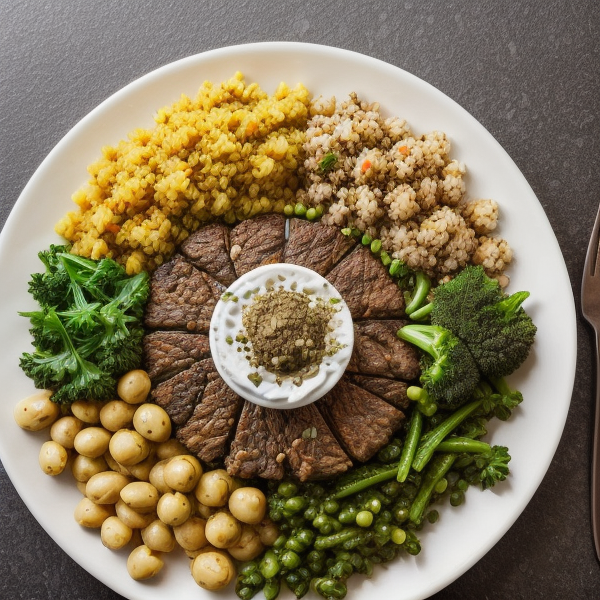Balancing Macronutrients in Your Vegan or Vegetarian Diet

Title: Balancing Macronutrients in Your Vegan or Vegetarian Diet
Introduction
As more and more people adopt vegan and vegetarian diets, there is a growing concern about how to balance macronutrients – carbohydrates, proteins, and fats – in their daily meals. While it may seem challenging at first, with careful planning and knowledge of various food sources, you can easily meet your body’s nutritional needs on a plant-based diet.
In this article, we will discuss the importance of each macronutrient, provide tips on incorporating them into your vegan or vegetarian diet, and debunk some common myths surrounding protein intake.
Carbohydrates
Carbohydrates are one of the primary sources of energy for our bodies. They are found in whole grains, legumes, fruits, and vegetables. The recommended daily allowance (RDA) for carbohydrates is 130 grams per day for most adult women and 180 grams per day for most adult men.
Tips for Incorporating Carbohydrates into Your Diet
1. Choose whole grains over refined grains: Whole grains are rich in fiber, vitamins, and minerals that are essential for good health. Examples include brown rice, quinoa, barley, and whole wheat bread.
2. Load up on legumes: Legumes such as beans, lentils, chickpeas, and peas are excellent sources of plant-based protein and complex carbohydrates. They also contain fiber, which helps regulate blood sugar levels and promotes satiety.
3. Eat plenty of fruits and vegetables: Fruits and vegetables are naturally low in calories and high in water content, making them an ideal choice for those looking to maintain a healthy weight. They are also rich in fiber, vitamins, and minerals.
Protein
Protein is essential for building and repairing tissues in the body, producing enzymes and hormones, and supporting immune function. While animal products are often considered the best source of protein, there are many plant-based options available.
Tips for Incorporating Protein into Your Diet
1. Combine plant-based proteins: To increase the protein content of your meal, combine different plant-based protein sources such as beans and rice, hummus and pita bread, or quinoa and roasted vegetables.
2. Opt for protein-rich foods: Some plant-based foods are naturally higher in protein than others. These include soy products like tofu and tempeh, nuts and seeds, and seitan made from wheat gluten.
3. Consider supplementation: If you find it difficult to meet your daily protein requirements through food alone, consider taking a high-quality vegan protein supplement.
Fats
Fats play a crucial role in maintaining overall health, including supporting cell growth, absorbing certain vitamins, and maintaining healthy skin and hair. While some fats are necessary for good health, it is important to choose healthier options such as monounsaturated and polyunsaturated fats rather than saturated and trans fats.
Tips for Incorporating Healthy Fats into Your Diet
1. Use healthy oils: Choose healthy oils such as olive oil, avocado oil, and coconut oil for cooking and dressings. These oils are rich in monounsaturated and polyunsaturated fats, which have been shown to reduce inflammation and improve heart health.
2. Snack on nuts and seeds: Nuts and seeds are not only a great source of plant-based protein but also contain healthy fats. Enjoy them raw, roasted, or as a topping on salads.
3. Add avocados to your meals: Avocados are a delicious and creamy addition to any meal. They are rich in healthy fats, fiber, and various micronutrients.
Myths About Protein on a Vegan or Vegetarian Diet
One of the most common concerns people have when transitioning to a plant-based diet is whether they will get enough protein. However, this is a myth. With proper planning and attention to food sources, it is easy to meet your daily protein needs on a vegan or vegetarian diet.
Here are some common myths about protein on a plant-based diet:
1. You need to eat large amounts of protein at every meal: This is not true. Like non-vegetarians, vegetarians and vegans do not need to consume excessive amounts of protein. The Recommended Dietary Allowance (RDA) for protein is 0.8 grams per kilogram of body weight per day for adults.
2. Plant-based proteins are incomplete: Another myth! All plant-based proteins are complete, meaning they contain all nine essential amino acids that our bodies cannot produce on their own. It is just a matter of combining different plant-based foods to ensure adequate intake of these essential amino acids throughout the day.
3. Vegan and vegetarian diets lack variety: False! A well-planned vegan or vegetarian diet can be incredibly diverse and flavorful. There are countless plant-based foods available, providing endless possibilities for creating delicious and nutritious meals.
Conclusion
In conclusion, balancing macronutrients on a vegan or vegetarian diet is achievable and essential for optimal health. By focusing on whole foods, choosing a variety of plant-based protein sources, and incorporating healthy fats into your meals, you can easily meet your daily nutritional needs while enjoying a compassionate and environmentally friendly way of eating.
